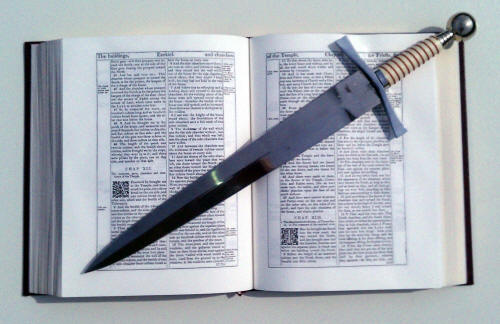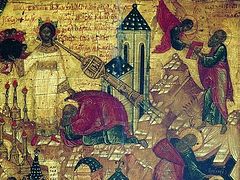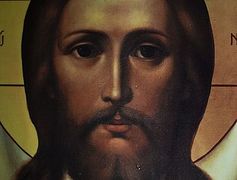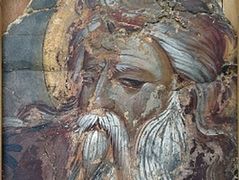
Some claim that Orthodoxy does not approve of self-defense or firearms specifically, specifically attacking the "take your purse and buy" a sword verse from Luke that is often used in support of armed Christian self-defense. Some even go so far as to say, or at least strongly imply, that Christians shouldn't kill in combat/war. What is the Orthodox Church's teaching regarding a Christian's right or ability to hurt or kill others in self-defense? As soldiers during war? What about defending one's family from violence?
The passage referred to is Luke 22:35-38:
And he said unto them, When I sent you without purse, and scrip, and shoes, lacked ye any thing? And they said, Nothing. Then said he unto them, But now, he that hath a purse, let him take it, and likewise his scrip: and he that hath no sword, let him sell his garment, and buy one. For I say unto you, that this that is written must yet be accomplished in me, And he was reckoned among the transgressors: for the things concerning me have an end. And they said, Lord, behold, here are two swords. And he said unto them, It is enough.
Christ is referring to when He sent out His disciples earlier (Luke 9:1-6), and they were told to not take any of these things, and indeed they had not lacked anything during that time. But now Christ is saying that they will need to take these things with them. St. Cyril of Alexandria says that Christ was warning them about the coming tribulations that the Jews would suffer, culminating in the destruction of Jerusalem. Blessed Theophylact says that Christ is simply saying that the special provision they had experienced before would not continue, and that they would need to take necessary care to provide for themselves, and that they would experience times of hunger, thirst, and face many adversaries. On the previous occasion, there was no mention of swords, but now Christ says that if they do not have a sword, they should sell their outer garment, and buy one. Had this been all that Christ said, one could have easily taken this as a command that all Christians should be armed. However, when the Apostles produced two swords, Christ said It is enough—which suggests that they had missed His point. It would seem, especially based on what followed when Christ was arrested, that the Apostles thought that Christ was calling on them to defend Him in some way. However, when St. Peter attempted to do just that, Christ rebuked him and said:
Put up again thy sword into his place: for all they that take the sword shall perish with the sword (Matthew 26:52).
Also, had this been Christ's point, two hundred swords would not have been enough, but Christ was in no need of human defense:
Thinkest thou that I cannot now pray to my Father, and he shall presently give me more than twelve legions of angels? But how then shall the scriptures be fulfilled, that thus it must be? (Matthew 26:53-54).
So what was Christ's point? There are a number of interpretations of the spiritual significance of buying a sword given by the Fathers, but having a small sword, or dagger, was considered a common necessity that a traveler would need, and so probably the literal sense of Christ's statement was to emphasize their need to beware of dangers, and to take necessary precautions:
The directive to buy a sword deserves a measure of separate consideration. Lined up as it is with purse, bag, and sandals, we can eliminate at once any idea that zealot sympathies are coming to expression with the commendation of the sword. The sword is thought of as part of the equipment required for the self-sufficiency of any traveller in the Roman world. Nothing more than protection of one's person is in view (John Nolland, Word Biblical Commentary, vol. 35C: Luke 18:35-24:53 (Nashville: Thomas Nelson, 1993), p. 1076).
It should also be noted that the word for "sword" here (machaira (μάχαιρα)) can refer to anything from a knife to a short sword (See Theological Dictionary of the New Testament, Volume 4, ed. Gerhard Kittel (Grand Rapids, MI: Eerdmans Publishing, 1964-1976), p. 524ff).
There are two related but distinct questions here: 1). What does Scripture say about the private ownership of weapons? 2). What does Scripture say about using force, either in self-defense, in defense of others, or as part of the military or police force?
As for the first question, there is nothing in Scripture that prohibits the private ownership of weapons. The passage in Luke 22 does not require us to own them, but it does not forbid them either.
In the Code of St. Justinian, there were restrictions on the private ownership of military grade weapons and armor, but even this did not prohibit the ownership of weapons such as staves, or knives (see Novel 85). It is true that this law was authored by a saint of the Church, but it reflected what was in the interest of the Roman state, which was to make revolts in a vast and diverse empire less likely. Rome also had a large standing army. On the other hand, in English history, the Kings of England long encouraged the practice of archery by the common people, because they did not have a large standing army, and in times of war, the skill of the average English bowman was in the interest of the state, and this necessarily required the common ownership of a very lethal weapon.
As for the second question, the use of force for Christians has long been a matter of debate because, for example, Christ taught us to turn the other cheek:
Ye have heard that it hath been said, An eye for an eye, and a tooth for a tooth: But I say unto you, That ye resist not evil: but whosoever shall smite thee on thy right cheek, turn to him the other also (Matthew 5:38-39).
The question we must ask about this passage is does the Old Testament law regarding an eye for an eye relate to personal revenge, or defending ones family, faith, or homeland from attack? It in fact pertains to personal revenge. This law was actually an improvement on the usual practice of exacting many times more punishment than the original offense had inflicted on the person offended. Christ raised the bar to the next level, and said that we should not seek personal revenge at all. However, we cannot and should not turn the other cheek when the defenseless are being attacked, because it isn't our cheek to turn.
Let's take a look at some other statements from the Scriptures:
Defend the poor and fatherless: do justice to the afflicted and needy. Deliver the poor and needy: rid them out of the hand of the wicked (Psalm 81[82]:3-4)
Learn to do good; Seek justice, Rebuke the oppressor; Defend the fatherless, Plead for the widow (Isaiah 1:17).
The problem is that, usually, oppressors don't stop oppressing the weak simply because we ask them nicely to do so. More often than not, force, or at least the threat of force is necessary. So do these scriptures contradict the commands of Christ? No, they refer to defending others, not to seeking revenge.
It is often asserted that Christ never used or advocated the use of force. This is simply not true:
And when he had made a scourge of small cords, he drove them all out of the temple, and the sheep, and the oxen; and poured out the changers' money, and overthrew the tables (John 2:15).
A scourge is not something used to gently influence someone—it is something used to violently beat other people, so as to inflict pain, in order to violently coerce them in some way or other. Whether He actually struck anyone, or merely threatened to, we are not told, but we do know that the money changers at least believed he would have, and left expeditiously.
Ss. Boris and Gleb are often cited by Orthodox pacifists as examples of the way Christians ought to respond to war. After their father, St. Vladimir, reposed, their brother sought to usurp the kingdom, and so plotted to kill them. They offered no resistance, because they did not wish to fight their brother, nor to see a bloody civil war. However, they were not facing an external enemy who was seeking the destruction or subjugation of their people, but their own brother, and so they chose the path of martyrdom. Their act of personal sacrifice was praiseworthy.
St. Alexander Nevsky faced a completely different situation, and Ss. Boris and Gleb actually played a role in his course of action. St. Alexander Nevsky faced an invasion from the heterodox Swedes, and so had to defend his people and his Faith.
Here is the Kontakion of St. Alexander Nevsky:
As thy kinsmen Boris and Gleb appeared to thee, bringing thee help from heaven when thou didst battle against Velgar the Swede and his warriors, so now, O blessed Alexander, come to the aid of thy kinfolk, and contend thou against those who wage war against us.
This refers to the following incident from the Life of St. Alexander Nevsky:
But there was a miraculous omen: at dawn on July 15 [the feast of St. Vladimir] the warrior Pelgui, in Baptism Philip, saw a boat, and on it were the Holy Martyrs Boris and Gleb, in royal purple attire. Boris said: "Brother Gleb, let us help our kinsman Alexander." When Pelgui reported the vision to the prince, St Alexander commanded that no one should speak about the miracle. Emboldened by this, he urged the army to fight valiantly against the Swedes.
Had St. Alexander Nevsky decided to not resist the Swedes, it would not have been a praiseworthy act, but rather a dereliction of duty. It would not have been a higher path, it would have been a sinful path. So in the lives of these saints we see the balance between turning the other cheek, and defending one's own. St. Alexander's actions were praiseworthy, and Ss. Boris and Gleb's were praiseworthy... and there is no contradiction between them because they all responded to different situations in complete accordance with the commands of Christ.
The following quote from the Russian Orthodox Church’s Social Concept Document, and the section on “War and Peace” is instructive:
When St. Cyril Equal-to-the-Apostles was sent by the Patriarch of Constantinople to preach the gospel among the Saracens, in their capital city he had to enter into a dispute about faith with Muhamaddan scholars. Among others, they asked him: “Your God is Christ. He commanded you to pray for enemies, to do good to those who hate and persecute you and to offer the other cheek to those who hit you, but what do you actually do? If anyone offends you, you sharpen your sword and go into battle and kill. Why do you not obey your Christ?” Having heard this, St. Cyril asked his fellow-polemists: “If there are two commandments written in one law, who will be its best respecter—the one who obeys only one commandment or the one who obeys both?” When the Hagerenes said that the best respecter of law is the one who obeys both commandments, the holy preacher continued: “Christ is our God Who ordered us to pray for our offenders and to do good to them. He also said that no one of us can show greater love in life than he who gives his life for his friends (Jn. 15:3). That is why we generously endure offences caused us as private people. But in company we defend one another and give our lives in battle for our neighbours, so that you, having taken our fellows prisoners, could not imprison their souls together with their bodies by forcing them into renouncing their faith and into godless deeds. Our Christ-loving soldiers protect our Holy Church with arms in their hands. They safeguard the sovereign in whose sacred person they respect the image of the rule of the Heavenly King. They safeguard their land because with its fall the home authority will inevitably fall too and the evangelical faith will be shaken. These are precious pledges for which soldiers should fight to the last. And if they give their lives in battlefield, the Church will include them in the community of the holy martyrs and call them intercessors before God.”
What is true of the defense of a nation on a big scale would also be true of the defense of one's family on a smaller scale.
As for self-defense in a situation in which one is in danger themselves, but in which no one else is in danger, I do not believe that Scripture forbids the use of necessary force to defend yourself from a serious assault (as opposed to a personal quarrel in which there was no real danger), but it is certainly true that it is praiseworthy to not defend yourself. It is less complicated if you do not have a family that is depending on you, and more complicated if you do. All life is sacred, and we should never take the shedding of blood, lightly, however, a husband and a father has to take care of his family. As St. Paul admonished: But if any provide not for his own, and specially for those of his own house, he hath denied the faith, and is worse than an infidel (1 Timothy 5:8). And this does not just mean that he needs to bring home a pay check, it also means that he needs to take care of them, and that includes their protection, and it also entails that he try to the best of his ability to continue to be able to provide for his family.
With regard specifically to the question of the private ownership of guns, there obviously is no Orthodox position, one way or the other. It is a question of wisdom, and reasonable people can disagree. I think we would all agree that if banning private gun ownership would eliminate gun crime, and if we never had cause to fear our own government, that this would be wonderful. However, it is not quite that simple, in my opinion.
I know that people in the United Kingdom and Australia generally think Americans are crazy for wanting to have private gun ownership, but I would point out to them that in both cases, they live in Island nations that do not have a 2,000 mile border with Mexico. We have been unable to stop a steady flow of drugs across that border, and we even have a huge human trafficking problem. If we had a gun ban in the United States, there would be no stopping a steady flow of illegal weapons into the hands of criminals. So we simply have a different set of circumstances.
An Orthodox Christian is free to be opposed to the private gun ownership, but it is not true that the Tradition of the Church requires anyone else to agree with them, nor does it prohibit the use of force in defense of one's country, family, or even one's person, depending on the circumstances.




It reads like the product of an unaccredited Bible college trained evangelical's defence of the notion of the God breathed nature of the second amendment.
It's also rather racist in tone as if all drugs, thrives and murderers are pouring over Americas southern border, never mind that America has plenty that are homegrown. It's also nieve in that Britain while being and island still has a large amount of drugs pouring into it along with issues of human trafficking. I spend considerable time in the UK as I'm trying to immigrate there to be with my future wife and I can assure the author that his notion of an island keeping out drugs etc is foolish. I'll also say that the gun ban works insofar as they do not have people dying on the streets at the rate we do either at the hands of criminals or at the hands of the police.
As has been noted it's very hard to live your neighbour when your fighting with him. While self defence may be acceptable from an Orthodox stand point private ownership of firearms designed to engage in warfare is far from clear and given the history of the Church very hard to defend without deifying the constitution which is a Protestant document at best an enlightenment one at worst and secular regardless.
One merely needs to open their eyes to the plight of the powerless all over the world today to see the results of the wicked against disarmed populations. Genocide (amongst other horrors) is sweeping Africa and the Middle East. Rape and other violence is sweeping Europe. Homosexual propaganda and abortion are sweeping everywhere the Western "leaders" can force them. And of course, wherever gun-free zones exist we find terrorists thankful there are still high minded individuals willing to sacrifice the lives and limbs of others for their utopian fantasies.
What a wicked and perverse generation we live in where telling men not to defend their own families is promoted, and what a foolish and spoiled bunch that would embrace such promotion. The number one job intended of a man since creation is the protection of his family.
Those of us that are blessed enough to reside in comparitively wealthy and safe (though quickly disintegrating) nations are doing so on the sweat, blood, and sacrifice of men greater and more courageous than ourselves.
May God have mercy on us and save us.
Of course, there have always been soldier saints, and without St. Constantine a general and political figure who helped to convert the Roman empire, I would probably not be Orthodox Christian. But it is not him that I follow, but one who has been called, "the Prince of Peace."
I quoted John Nolland because the Fathers usually do not comment on mundane cultural issues that were not matters of controversy, and so we do sometimes have to consult scholars to find out how things were at the time and place of a particular passage of Scripture.
It's difficult to love your neighbor when your harming them.
As I'm on the subject, we also should be careful not to become 'protestant' in quoting from the Fathers to support our own opinions. There is the Consensus of the Fathers on any given subject, (baring in mind that not all Fathers spoke about all subjects) but this would require much more quoting and effort than, I suppose, would fit the space allotted for this website.